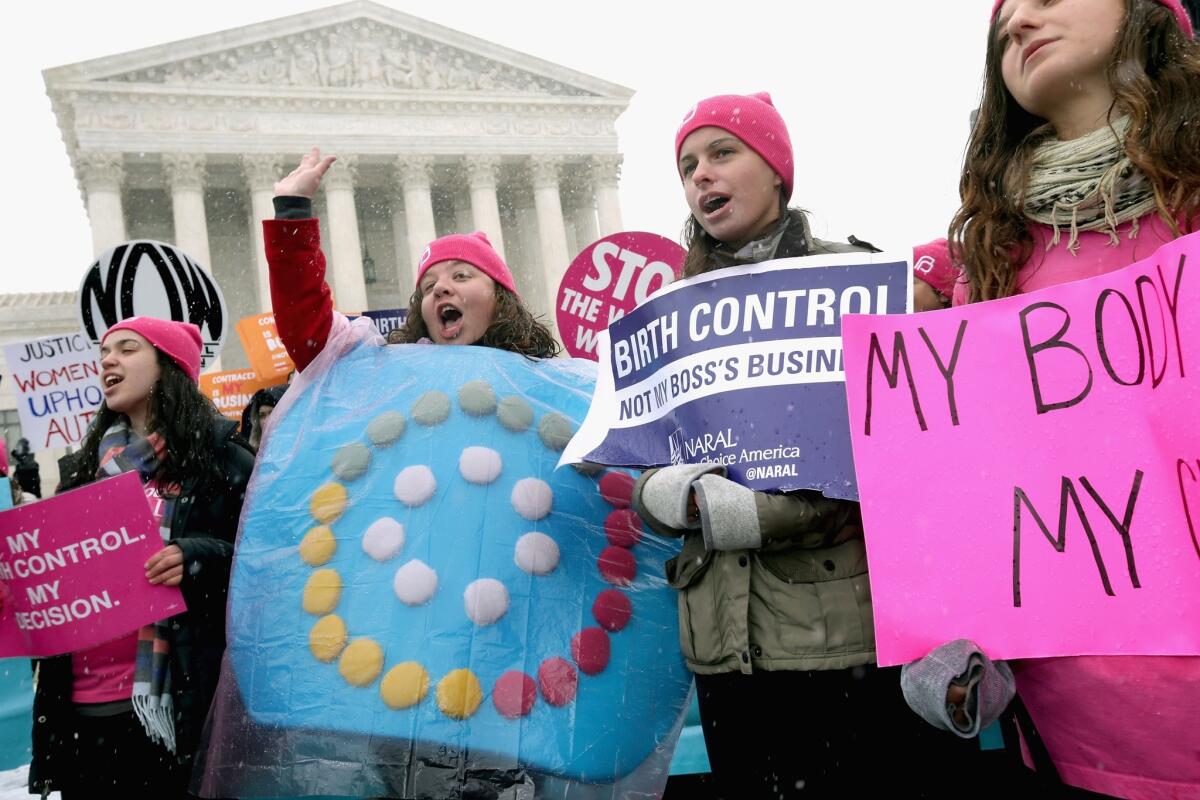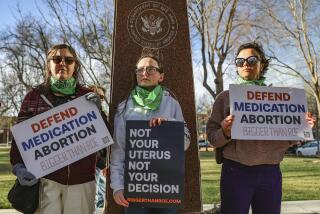Contraception exemptions may help Hobby Lobby win Obamacare battle

The Supreme Court took up the question Tuesday of whether for-profit corporations had the right to exercise a religion, and the answer seemed clear from the justices’ questions: closely held corporations do. That bodes well for Hobby Lobby and Conestoga Wood Specialties, the companies challenging the Obama administration’s requirement that their health insurance plans cover contraception.
But that may not be the deciding factor in the case. Just as important are whether the federal government can show a compelling interest in providing easy access to contraception, and whether the mandate is the least-restrictive way to promote that interest. And the administration’s problem on that front appears to be the fact that there are exemptions -- granted by the law and by the administration -- to the mandate.
A transcript of Tuesday’s arguments show a sharp division between -- surprise! -- the court’s four liberal justices and its five conservatives as to whether the two plaintiffs were protected by the Religious Freedom Restoration Act, a 1993 law that bars government from “substantially” burdening “a person’s exercise of religion.”
The liberals, and particularly the three female justices, expressed deep skepticism that for-profit companies could actually engage in a religious exercise. The conservatives, and especially Chief Justice John Roberts, saw little to distinguish closely held corporations such as Hobby Lobby and Conestoga Wood Specialties from sole proprietorships and partnerships, which the courts have already deemed eligible for the law’s protections.
If the act does apply to those companies, which collectively employ thousands of people, the administration would have to show that the contraceptive mandate is the “least restrictive means” to further a “compelling governmental interest.” And if it’s so compelling to require employers’ health plans to include contraceptive coverage, Roberts and Justice Samuel Alito asked, why did the Affordable Care Act allow people to hold on to “grandfathered” plans that didn’t include the coverage?
Ah yes, those grandfathered plans. Although the ACA requires policies that went into effect after Jan. 1, 2014, to cover 10 “essential health benefits,” including contraceptive care, it exempt policies that have been in effect and essentially unchanged since before the law was enacted. That exemption was the basis for President Obama’s (in)famous promise that “if you like your health plan, you can keep your health plan.”
Solicitor General Donald Verrilli argued that the grandfathered plans are gradually disappearing as people opt for different offerings. But as Roberts noted, there’s no date certain for grandfathered plans to be eliminated. In theory, they could continue until all of their current holders reach retirement age and switch to Medicare.
As for the “least restrictive means” test, several of the conservative justices asked why for-profit corporations couldn’t have been offered the same deal that religious-affiliated employers were provided. For religious schools, church-affiliated hospitals and the like, the administration struck a deal that calls for insurers to offer contraceptive coverage directly to their employees at no cost.
Along those lines, Justice Stephen Breyer, one of the court’s Democratic appointees, asked Verrilli to explain why the government couldn’t pay for contraceptive coverage itself. After all, as noted by plaintiffs’ lawyer Paul Clement, the government has a program -- Title X -- that subsidizes contraceptives and family planning services for lower-income women.
Verrilli offered several reasons why those alternatives weren’t acceptable, but his strongest argument was that if for-profit companies have a right to exercise religious rights, it doesn’t trump the rights Congress grants to individual employees by statute. RFRA, after all, was focused on individuals, not corporate shells.
“[O]nce you make a choice to go into the commercial sphere, which you certainly do when you incorporate as a for-profit corporation, you are making a choice to live by the rules that govern you and your competitors in the commercial sphere,” Verrilli argued. “But even if you disagree with me about that, what I’d like to leave the court with, is what I think is the most important point here, is that if this exemption were granted, it will be the first time under the Free Exercise Clause [of the 1st Amendment] or under RFRA in which this Court or any court has held that an employer ... may be granted an exemption that extinguishes statutorily guaranteed benefits of fundamental importance.”
Verrilli’s problem -- and the administration’s problem -- is that the court’s conservative majority appears to see the owners of closely held companies like Hobby Lobby and Conestoga Wood Specialties as the very sort of individuals whose beliefs RFRA was designed to protect.
(As an aside, let me point out -- again -- that Congress could have avoided this problem and several others by severing the link between employment and health insurance. It’s something of an accounting fiction that employers cover all or part of their workers’ premiums; that money is part of the workers’ compensation package, so in effect it’s coming out of their wages. But because employers write the checks, they feel entitled to have some say over the coverage their workers choose.)
ALSO:
How anti-gay Christians evangelize abroad
What would a Republican president do about Ukraine?
Follow Jon Healey on Twitter @jcahealey and Google+
More to Read
A cure for the common opinion
Get thought-provoking perspectives with our weekly newsletter.
You may occasionally receive promotional content from the Los Angeles Times.











